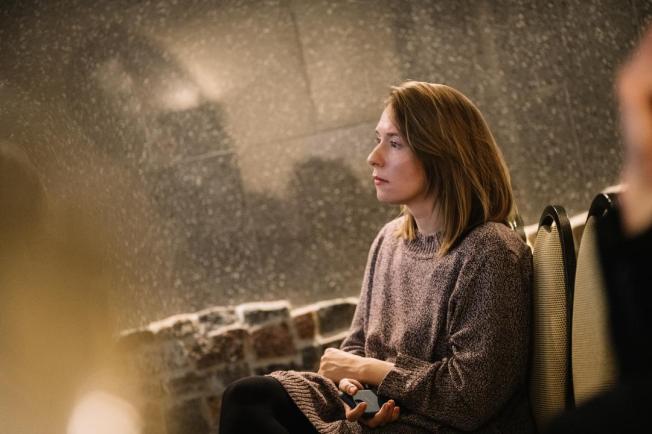As anti-government protests continue to engulf Belarus after the August 9, 2020 election, there’s a revolt brewing inside some state media outlets, where journalists are striking and quitting over what they see as their employers’ failure to accurately cover the protest movement and the government’s harsh response. Thousands of people have been detained at the demonstrations including dozens of journalists, as CPJ has documented. According to the Belarusian Association of Journalists (BAJ), most have been released.
In defiance, some of the most famous personalities in state TV, including Andrey Makayonak of Belarus-1’s “Good Morning Belarus,” have left their jobs, and other employees are striking, according to news reports. At Zviazda, one of the oldest state-run newspapers in the country with a print circulation of 14,000, authorities replaced the top editor with a former information minister on August 20, according to BAJ.
Tatsiana Tkachova, a well-known photojournalist at Zviazda and a winner of the 2020 World Press Photo contest, told CPJ she quit the newspaper when it wouldn’t cover the protests. CPJ interviewed Tkachova via phone on August 20 about her decision, and what this moment means for Belarusian state media. Her answers have been lightly edited for length and clarity. CPJ tried to reach Zviazda for comment via phone but was unable to get through.
What was it like working for state media in the weeks before you quit?
The pressure and control now is unlike anything that happened before. [Before the protests] we felt much less controlled than state-owned TV channels or newspapers such as Belarus Segodnya, formerly Sovetskaya Belarus. Belarus Segodnya is like the personal newspaper of President Aleksandr Lukashenko, and it reports to the administration of the president, not the ministry of information. Some of my friends work there and they tell me they have orders on what to write, in what way to write, and so on. Zviazda used to be more liberal [less propagandistic]. I personally was not forced to make radical compromises — I am a photographer. But our politics department was strictly controlled, and they had to write the way they were told to write. I have been working as a photographer at Zviazda for three years. I am leaving the newspaper effective Monday [August 24].
After the protests started, we were trying to react, to report about what was going on in Belarus. It turned out to be impossible. We, the journalists of Zviazda, wrote an appeal [to our bosses] condemning violence [and asking to report on it]. But the newspaper continued business as usual. So we were ready to go on strike and signed a statement about our plans. Then the bullying started. We were told that we would be fired and many journalists became so scared that they withdrew their signatures. Five journalists decided to quit and some 60 employees decided to stay. I don’t know how I will live [without a job]. I will continue to communicate with some former colleagues, but I will cut off relations with others.

What kind of direct pressure did the newspaper experience from the authorities?
An official from president’s administration visited us. She told us that we don’t understand what is going on in the country, that we are paid money by the state to do our jobs. Journalists laughed when she spoke. She refused to make any compromises [with the newspaper staff]. The newspaper became a propaganda outlet. The authorities replaced our chief editor today [August 20]. Now, it is clear that the newspaper will not change the way it reports.
There are reports that in some state media outlets striking journalists have been replaced by reporters from Russia. What do you know about this?
Yes, this practice is said to be used at Belarusian state-owned TV channels. When national TV journalists went on strike, they say Russian journalists were invited [to replace them]. However, I do not watch these channels and cannot confirm this information. [Editor’s note: Aleksandr Lukasenko admitted that some Russian journalists have replaced Belarusian journalists working in Belarusian state TV, according to the official state news agency BelTa.]
What is the overall situation with state media right now?
Journalists of Belarusian TV are going to create a new online media outlet. We [reporters from Zviazda] are also thinking about something similar. Indeed, many journalists have left state media. As far as I know, almost the entire department has left Belarus Segodnya. They were reporting on social problems. Many journalists are leaving BelTa. This has never happened before. Komsomolskaya Pravda daily [which has been producing more objective reports on the protests] has already been punished — the outlet can no longer be printed in the state-owned printing house.
[Editor’s note: CPJ called departments at Belarus Segodnya and BelTa for comment but was unable to reach anyone. BAJ secretary Olga Khvoin confirmed that Komsomolskaya Pravda cannot use the state-run printer; CPJ’s phone call to the Belarus information ministry on the matter was not immediately answered.]
Why did you work for a state-owned media in the first place?
I have worked for Zviazda for just three years. Before that, I was looking for a job for a long time. There were many things I did not like about Zviazda but it was important for me to earn a salary. While working there, I did not have to make compromises as I was not in the politics department. I am a photographer, I traveled around Belarus taking pictures of ordinary people’s lives since it was not forbidden to do some projects. I am leaving because I am ashamed. The newspaper does not inform the public about what is really going on in our country. It is bad. I was shocked to hear about what has happened in the Akrestsin detention center in Minsk [where protesters and journalists have been detained and in some cases beaten]. I cannot understand how my newspaper continues to publish articles about the price of tomatoes or other vegetables in a market but misses the Akrestsin story.
